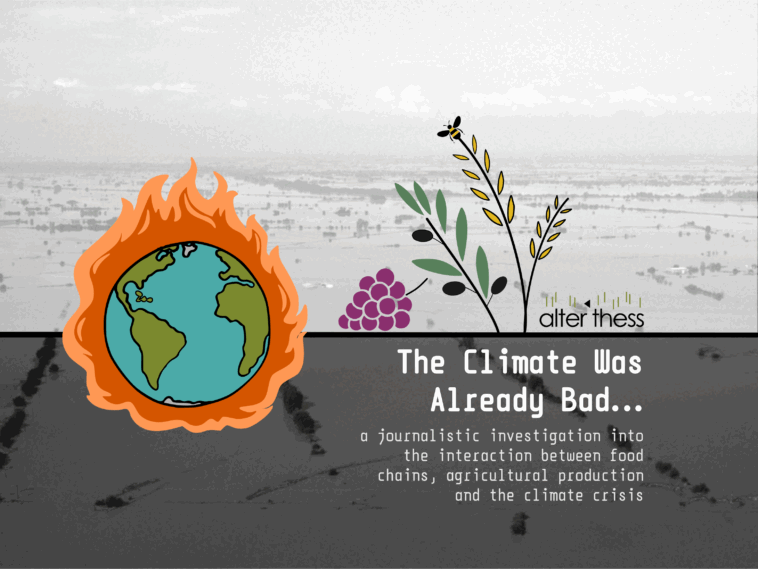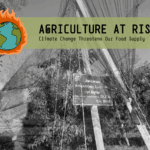Have you ever considered the impact of the climate crisis on the variety of products on your daily table? Do you remember how many extra euros you paid for olive oil because of the unusually warm winter of 2023? Conversely, have you ever thought about how choosing to buy from a local producer’s stall rather than a supermarket shelf can serve as an act of resistance against a powerful agri-industrial industry?
Questions like these, which quite literally bring the issue of climate justice to our plate, are raised by Alterthess’ research project “The Climate Was Already Bad…”, which began in February 2025 with the support of the Rosa Luxemburg Foundation – Greece Branch.
Food today is treated as a commodity, like everything else under capitalism. Yet, it is also a universal human right. It is an essential prerequisite for a healthy body and mind. At the same time, food embodies memories, culture, and social relations. Undeniably, what we eat is a deeply political matter. And, as the disruptions to the agri-food chain following Covid-19 and the war in Ukraine have reminded us, food security can never be taken for granted.
Climate change is striking the agricultural sector with particular intensity. Its effects are now being felt worldwide, but also at the very heart of rural Greece, threatening both the livelihoods of producers and our very ability to produce food.
The new Alterthess study examines the consequences of the climate crisis on Greek agriculture, focusing on the region of Central Macedonia, home to the country’s largest plain. According to scientific data, Central Macedonia is among the areas warming the fastest in Greece, a reality that translates into rising temperatures, prolonged droughts, and changes in rainfall patterns.
How are crops affected by these transformations, and what adjustments are producers forced to make in response?
Do farmers have the government as an ally in this struggle? Or perhaps the European Union’s Common Agricultural Policy?
Alterthess’s research also addresses the opposite question: what role does industrial agriculture play in exacerbating the climate crisis? Today’s dominant agricultural model, based on monocultures and heavily dependent on pesticides, chemical fertilizers, and fossil fuels, is not only unsustainable for farmers but also a significant source of greenhouse gas emissions, further intensifying environmental problems.
This reveals a twofold crisis: on one hand, agriculture suffers from climate change, and on the other, it contributes to it.
Alterthess investigates ways to break this vicious cycle. The study highlights initiatives that embrace sustainable farming practices, such as organic agriculture, as well as alternative distribution networks that promote local products while reducing the carbon footprint of our food.
To identify and map both the problem and potential solutions, the Alterthess team conducted extensive field research, meeting producers directly where they confront the challenges of the climate crisis every day, out in their fields. The study focuses on emblematic products of Central Macedonia: wine, honey, peaches, olives, mussels, and buffalo. At the same time, Alterthess carried out interviews with climate scientists, agronomists, economic analysts, institutional representatives, and environmental organizations, seeking strategies that could contribute to a more resilient and climate-positive agri-food system.
In its final stage, Alterthess will organize two hybrid events. The first will bring together representatives of alternative initiatives from Thessaloniki, while the second will host participants from Balkan and Mediterranean countries. The aim is to foster the exchange of best practices in sustainable agriculture, strengthen dialogue, and perhaps lay the groundwork for future collaboration.
We hope that “The Climate Was Already Bad…” will serve as a modest contribution to how we think about the climate crisis, the agricultural sector, and, ultimately, the very food we eat.
Research, text editing, podcasts scripts: Stavroula Poulimeni-Georgia Anagnou
Video: Theofilos Kalaitzidis
Sound engineering–graphics-Podcasts Production: Menelaos Exioglou
Photos: Afroditi Michailidou
Up next: Agriculture at Risk: Climate Change Threatens Our Food Supply
The Research “The Climate was already bad…” was realised with the support of Rosa Luxemburg Stiftung-Office In Greece. Read the Complete Research here


